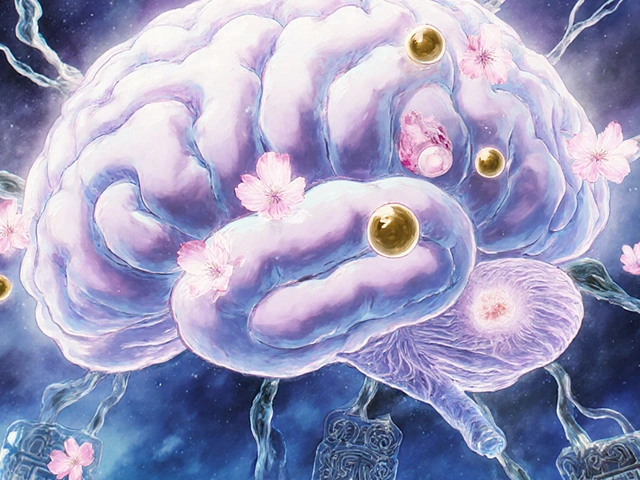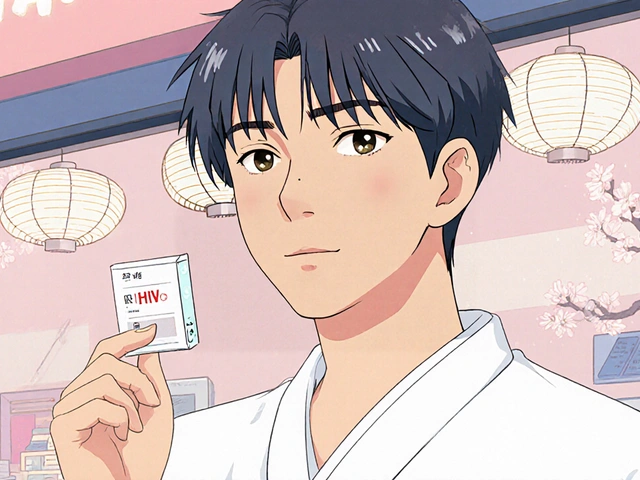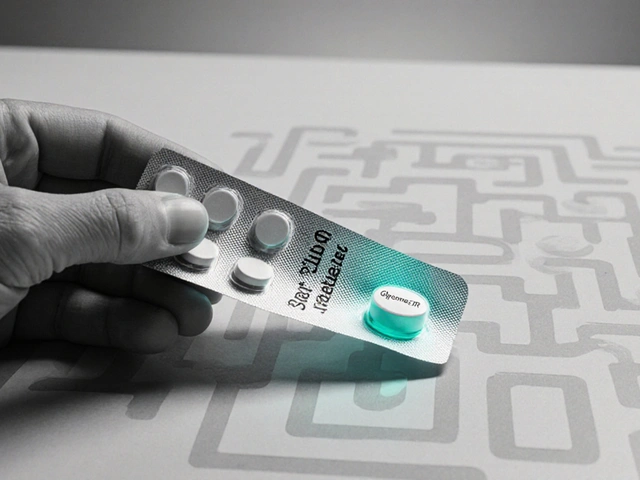Imagine waking up every day, checking the mirror, and seeing stubborn spots and angry bumps staring back. For people with severe acne, it isn’t just a teenage inconvenience—it can stick around for years, wreck your confidence, and turn simple things like taking a photo or hanging out with friends into an ordeal. Enter Accutane, also known as isotretinoin, a tiny pill that's built a reputation for being both the holy grail and a source of dread for anyone dealing with relentless acne. Some call it a miracle; others share horror stories on forums and in support groups. Either way, nobody shrugs their shoulders about Accutane. It has a massive impact—and not just on your skin, but on your whole life. So let’s get under the skin of Accutane and lay out what really matters for anyone thinking about it, using it, or just plain curious.
How Accutane Works: The Science Behind the Pill
Accutane isn’t your run-of-the-mill acne cream or over-the-counter spot treatment—it’s the nuclear option for acne, usually reserved for the toughest cases. Chemically, it’s called isotretinoin, a derivative of vitamin A. Here’s where things get interesting: instead of just killing surface bacteria or drying out pimples, Accutane goes for acne’s jugular by shrinking the oil glands in your skin (those pesky sebaceous glands). Less oil means your pores don’t clog up as much, and bacteria don’t get as cozy.
But the story goes deeper. Accutane changes how your skin regenerates itself. It accelerates skin cell turnover, helping to clear out the old, clogged cells that stick together like glue. If you check any research from the 1980s onwards, you’ll see pretty dramatic numbers: studies found that up to 85% of patients saw their severe acne virtually disappear—often for years. Some folks, like myself living out here in sun-drenched Adelaide, get a bit freaked out reading the long leaflets from the pharmacy, but those numbers don’t lie.
One lesser-known fact: Accutane was first developed as a cancer treatment before doctors noticed how well it cleared skin. It wasn’t designed for acne at first. The way isotretinoin resets your skin’s oil production is unique among acne meds—you don’t get this with antibiotics or topical retinoids. Also, Accutane affects inflammation, which is key because a lot of acne isn’t just about blocked pores but about angry, swollen skin. Less oil, less blockage, less inflammation: that’s the triple threat.
Yes, Accutane (or isotretinoin) is extremely effective, but it’s no casual affair. It's only prescribed when everything else fails. The dose is tailored to your weight and your acne’s severity, and most courses run around 4-6 months. Your dermatologist will probably talk about your skin ‘purging’ at first (it can get worse before getting better), and that’s real. The medication builds up, and with patience, the tide usually turns for the better.
The Real Day-to-Day: What to Expect on Accutane
Everyone’s Accutane journey is a little different, but there’s a common thread: it’s a rollercoaster. My wife Miranda would joke that watching me take it was like seeing someone train for a marathon, just with more chapstick. That brings us to the side effects, which are infamous. The most universal side effect? Dry skin and lips. No exaggeration: your lips will peel, flake, and split if you don’t keep a steady supply of balm. Stock up—you’ll need several tubes stashed everywhere.
Your nose can get dry (think nosebleeds in the weirdest places), and your eyes might feel sandy. Some folks notice muscle aches, especially in the gym. And, yes, there’s the sunlight issue. Out in Adelaide, where the sun is relentless, sunscreen is your new best friend because Accutane makes you way more sun-sensitive. Leaving the house without SPF is a fast track to lobster-red skin.
One thing people don’t talk about enough: mood changes. Accutane’s link with depression and anxiety pops up in medical literature and support forums. Most people will have regular mental health checks with their dermatologist. That’s not just protocol—some folks notice feeling low or irritable, and it never hurts to keep tabs on your mental health regardless.
If you’re planning to try for a baby, this medicine is a firm no-go. Isotretinoin is highly teratogenic, meaning it can cause severe birth defects. Women of childbearing age have to use two methods of contraception and have regular pregnancy tests while on it—no compromises. Men don’t need to be as strict, though, since the drug doesn’t affect sperm in the same way, but always double-check with your doctor.
Here’s a handy rundown of side effects people notice most (with rough frequency):
| Side Effect | How Common |
|---|---|
| Dry lips/skin | Nearly everyone |
| Nosebleeds | About 30% |
| Sun sensitivity | Very common |
| Mood changes | 5 - 10% |
| Back/muscle pain | 10 - 20% |
| Temporary hair shedding | 5% |
Doctors usually run regular blood tests too—not because it’s fun, but because Accutane can mess with your cholesterol and liver enzymes. That’s not a big deal for most, but they’ll want to keep an eye on it, especially if you’ve got any family history of high cholesterol or liver problems. And if you drink? Cut back. Your liver’s already pulling overtime on this stuff.
Here’s what I wish someone had told me before starting: it’s not a quick fix. Be patient. Your skin might actually look worse before it looks better, and you’ll miss that slice of wedding cake that’s been sitting in the fridge (because many dermatologists suggest cutting down on sugar and fatty foods during treatment). Make use of moisturizers—get hype about the plain ones, no fancy scents. Wear hats and sunglasses even on cloudy days. And talk to your friends or therapist if you’re down—even just knowing it’s a possibility makes it easier to handle.

Accutane Myths, Realities, and the Results
Misinformation about Accutane is everywhere, from outdated horror stories to over-the-top miracle claims. Plenty of people think that you pop a few pills and wake up with model skin—sadly, it’s messier than that. The skin purge (an initial worsening) freaks a lot of people out. It’s common, but it’s temporary. And the ‘Accutane always ruins your mood’ rumor? Yes, mood changes happen, but for the large majority, it’s not dramatic if you keep in touch with your doctor and check in with yourself.
One of the stickiest myths is that Accutane causes massive, permanent damage to your body. While it is a very strong medicine and comes with real risks, studies from Australia and the U.S. have shown that permanent side effects are rare if you follow your dermatologist’s advice and stick to your check-ups. Joint pain and dry skin can linger for a bit after you finish the course, but most side effects fade as your body clears the drug.
Here’s the part that people are right to get excited about: the results can be long-lasting. In a multi-country review published in 2022, about 8 out of 10 people stayed mostly acne-free for at least two years after finishing their course. Relapses happen, especially in women with hormonal acne, but many never need a second round. And if you do? The second course is usually much more manageable because both you and your skin know what’s coming.
What about scarring? The earlier you start Accutane once severe acne sets in, the better chance you have of preventing deep, permanent scars. For people who’ve dealt with spot after spot turning into constant redness, it’s a big relief when the breakouts stop. Just remember: Accutane won’t erase old scars, but once the pimples stop, you can look into treatments like microneedling or laser to tackle the marks left behind.
Let’s bust a few rumors:
- Accutane doesn’t shrink your nose or ears (yep, I’ve seen that online).
- It won’t kill your libido—there’s no scientific proof.
- You don’t have to quit sports—but do listen to your body.
- Most people can keep up their daily routine with a few tweaks.
- And no, it doesn’t turn you orange—unless you eat nothing but carrots during your course.
The sense of freedom after finishing Accutane is tough to overstate. People talk about being able to wear any clothes, walk into bright light without makeup, and join group selfies instead of ducking out. The emotional shift can be massive. It’s not vain to care about your skin—it’s about feeling like yourself again.
Tips for Getting the Most Out of Accutane
Thinking about Accutane or just started it? Here’s what helps most people make it through with fewer hiccups. First: embrace hydration like it’s your job. Use gentle cleansers, thick creams, and scent-free lip balms from day one—and stick with them even if your skin feels okay in week one, because dryness can hit all at once. Miranda snuck a tub of heavy moisturizer into my backpack one morning, and honestly, it saved me after windy days out here in Adelaide.
Don’t skip your blood tests or dermatologist appointments. These checkups aren’t busywork—they spot problems early, like liver bumps or rising cholesterol. If you start seeing big changes (persistent muscle pain, vision changes, or odd mood swings), tell your doctor fast. It’s better to annoy them than push through and regret it later.
Diet plays a role—but not as much as people fear. You don’t have to turn into a monk, but aim for plenty of water, cut back on junk food, and avoid mega-doses of vitamin A supplements, since Accutane already loads your system up. Too much vitamin A (including cod liver oil or multivitamins) can be risky while you’re on this medication.
Social life takes a hit for some. Don’t be shy about explaining what you’re going through—most folks know someone who took Accutane, and you’ll be surprised at the advice people offer. Carry chapstick everywhere, and keep a backup in your bag, car, and jacket. Sunglasses and hats aren’t just for style—they’re your best defense against peeling and redness. You’ll thank yourself later.
Some more concrete tips:
- Plan big events after your course if you can—your skin may not be camera-ready right away.
- Have backup contacts or glasses because eye dryness can make contacts tough to wear.
- Keep a daily moisturizer routine even after you finish the meds.
- Look after your mental health and talk about anything that feels off.
- Be gentle with workouts and let your body rest if you feel sore.
If you ever get pregnant on Accutane or miss a birth control dose, tell your doctor straight away—it’s urgent. For blokes, the fertility concerns aren’t an issue, but if you’re helping your partner through it, give them a hand with reminders and support.
The last thing I’ll say: don’t let fear hold you back, but do respect the process. The impact Accutane has reaches beyond skin—it’s about reclaiming comfort in your own body. Ask questions, take your meds, and arm yourself with good, honest info. There’s light at the end of the tunnel, and clearer days ahead really do exist.






Accutane felt like getting punched in the face by a very polite dermatologist. My lips turned into desert sandpaper, but man-after six months, I walked into a pool party without a single pimple. No makeup. No filter. Just me, sunburnt and free. I still keep chapstick in my sock drawer. Worth every scaly day.
Also, the ‘Accutane shrinks your nose’ myth? Someone out there is selling that as a TikTok trend. Please stop.
sooo i started accutan last month and my skin is like… worse? like i thought it was gonna be like magic but now i look like a dragon who lost a fight with a blow dryer. my lips are cracked so bad i cry when i eat pizza. but my doc says its purging so i guess i just gotta ride it out? also i keep forgetting to put on sunscreen and now my nose is red like a tomato. oops.
Let’s deconstruct this with epistemological rigor. The pharmacokinetics of isotretinoin are not merely ‘oil-gland suppression’-this is a systemic retinoid receptor modulation event mediated via RARα and RARγ isoforms, leading to downregulation of sebaceous gland hypertrophy and inflammatory cytokine suppression (IL-1α, TNF-α). The 85% clearance rate cited is misleadingly optimistic; longitudinal studies (e.g., JAMA Dermatology 2020) show relapse rates up to 32% in female patients with PCOS comorbidity. Furthermore, the ‘mood changes’ narrative is grossly underreported in clinical literature. SSRIs are frequently co-prescribed, yet the neurochemical cascade involving serotonin transporter inhibition by retinoids remains unaddressed in patient education pamphlets. You’re not ‘just dry’-you’re undergoing a neuroendocrine recalibration. And yes, your liver enzymes are probably elevated. Get your ALT checked weekly.
Also, ‘cutting sugar’? Please. Glycation is a red herring. Focus on omega-3:6 ratios instead.
OMG I JUST FOUND OUT MY BOYFRIEND IS ON ACCUTANE AND HE’S BEEN CRYING IN THE SHOWER AND I DIDN’T EVEN KNOW WHY 😭😭😭 HE SAID HIS LIPS FELT LIKE THEY WERE MADE OF GLASS AND I WAS JUST THINKING HE WAS BEING DRAMATIC BUT NOW I GET IT 😭 I RAN TO THE STORE AND BOUGHT 7 TUBES OF LIP BALM AND NOW I CARRY THEM IN MY PURSE LIKE A MIRACLE MEDICINE 🙏 I EVEN MADE HIM A ‘ACCUTANE SURVIVAL KIT’ WITH SUNSCREEN, MOISTURIZER, AND A NOTE THAT SAYS ‘YOU’RE STILL HOT EVEN IF YOU LOOK LIKE A SCALY WIZARD’ 🥺💖
HE SAID HE LOVES ME. I THINK I’M A HERO.
Hey everyone-just wanted to say this post is honestly one of the most thoughtful, grounded takes on Accutane I’ve read in years. It’s easy to get lost in fear or hype, but the way it balances science with real-life experience? That’s the gold standard.
For anyone on the fence: this isn’t a magic wand, but it’s the closest thing we’ve got to a reset button for your skin. I’ve seen friends go from hiding behind hoodies to traveling solo, from avoiding mirrors to posting selfies on Instagram. The side effects? Real. But temporary. The mental health piece? Critical. Talk to someone. Journal. Don’t suffer in silence.
And yes-chapstick is your new soulmate. I keep one in my car, my jacket, my work drawer, and my nightstand. I once bought a bulk pack of 24 because I panicked during a desert road trip. Worth it.
If you’re in the US, reach out to local acne support groups. Some are run by people who’ve been through it. They’ll send you memes, recipes for soothing smoothies, and sometimes even free samples of fragrance-free lotion. You’re not alone. And your skin? It’s going to thank you.
Also-don’t forget to hug yourself after your last pill. You earned it.
This is a dangerously oversimplified, emotionally manipulative piece of pseudo-medical propaganda. The cited 85% efficacy rate is drawn from outdated, industry-funded trials with inadequate follow-up. The omission of the 2019 meta-analysis linking isotretinoin to inflammatory bowel disease is negligent. Furthermore, the casual dismissal of psychiatric risk as ‘only 5–10%’ is statistically irresponsible-real-world data suggests underreporting by a factor of 3–5x. The author’s anecdotal tone undermines clinical caution. One does not ‘just use chapstick’ and move on. This is a teratogenic, hepatotoxic, and potentially neuropsychiatric agent. If you are not under strict monthly monitoring, you are not being treated-you are being experimented on. Shame on this platform for amplifying such a lax, feel-good narrative.
I appreciate the balance in this post. As someone who watched a close friend navigate Accutane for over a year, I saw how exhausting it was-not just physically, but emotionally. The dryness, the fatigue, the quiet moments of doubt. What stood out most was how little the medical system prepared her for the loneliness of it. The side effects were discussed, but not the weight of feeling ‘broken’ while everyone else seemed fine.
I’d add: even if your skin clears, give yourself grace. Your body just underwent a major shift. It’s okay to still feel strange about your reflection for a few months after. Healing isn’t linear. And it’s okay to not be ‘inspired’ by the journey. Sometimes, just surviving it is enough.
YASSS GIRL I’M ON IT RIGHT NOW 😭💕 I’VE BEEN ON ACCUTANE FOR 3 MONTHS AND MY SKIN IS ACTUALLY… KINDA GLOWING??? (I KNOW, I KNOW, I DIDN’T BELIEVE IT EITHER 😅)
Chapstick? 3 tubes gone. Sunscreen? SPF 50 EVERY. SINGLE. DAY. Even indoors. My dog now follows me around with a hat in his mouth. 😂
Also-DON’T IGNORE THE MOOD THING. I got super weepy one week and thought I was just PMSing. Then I told my derm and she said ‘oh yeah, that’s common’ and we adjusted my dosage. It’s not weakness. It’s chemistry.
And yes, I cried when I saw my first clear selfie. Worth it. 💪✨
PS: If you’re reading this and scared? You’re not alone. We got you. 💗
As a dermatology resident in Mumbai, I see 15–20 patients per week on isotretinoin. The biggest mistake? Stopping early because of dryness. The purge phase is real, but it’s also the sign the drug is working. I’ve had patients quit at week 8-then come back at week 20 with worse cysts. Don’t do that.
Also: in South Asia, many patients skip sunscreen because they think ‘it’s cloudy’ or ‘I’m not fair-skinned.’ That’s dangerous. UV damage + isotretinoin = permanent hyperpigmentation. Use zinc oxide, not chemical filters. And yes, moisturizers with ceramides are non-negotiable.
For women: if you’re on birth control, use two methods. I’ve seen cases where people relied on pills alone and got pregnant. It’s not a risk you take lightly.
And to everyone: this isn’t vanity. It’s quality of life. If you’re avoiding photos, skipping parties, or feeling ashamed-this is your chance. It’s hard, but it’s worth it. You’re not just treating acne-you’re reclaiming your space in the world.
Just finished my course last week. I went from ‘I can’t go to the beach’ to ‘I wore a tank top and danced in the rain.’ I didn’t think I’d ever feel that free again.
Side effects? Oh yeah. My lips were like sandpaper, I had nosebleeds at 3 a.m., and I once cried because my moisturizer had lavender in it (too strong). But here’s the thing-I didn’t give up. I bought a humidifier, drank water like it was my job, and started wearing sunglasses indoors because my eyes were so dry.
And the best part? My little sister just started it. I gave her my entire ‘Accutane Survival Kit’-chapstick, lip balm, sunscreen, and a playlist called ‘Clear Skin Vibes.’ She’s scared. I told her: ‘It’s a tough ride, but you’re gonna come out the other side looking like you finally met yourself.’
You got this. I believe in you.
My skin cleared. My confidence didn’t. Took me another year to stop flinching when someone took a photo. Accutane fixed my face, but healing takes longer.
That last comment? That’s the quiet truth no one talks about. You can have clear skin and still feel like a stranger in your own reflection. Healing isn’t just about the pills-it’s about learning to look at yourself again without fear. Thank you for saying that.